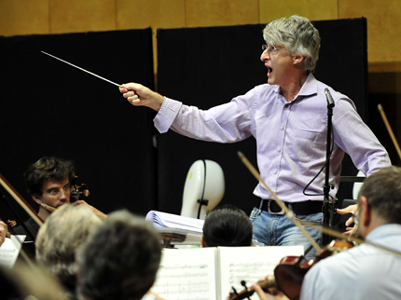By: Frank Cadenhead
Odd behavior marked the scheduled appearance of Gennady Rozhdestvensky at the helm of the Russian National Orchestra in Paris on Monday, November 28. The orchestra was at the Philharmonie for a short, two stop, tour. Two days before, at a concert in Baden-Baden, he conducted a program of Prokoviev’s Classical Symphony, the Scriabin Piano Concerto and the Shostakovich Ninth Symphony, the program to be repeated at the Philharmonie de Paris.
Apparently, the day of the performance, Rozhdestvensky saw that the printed entry ticket for the Philharmonie had only the name of the orchestra and not his and decided not to perform that evening. No notice appeared in the major French press but information on social media made the reason for the cancellation clear. Declaired “ill” by an announcement from the stage, it was announced that the pianist of that evening, Mikhail Pletnev, would conduct. Pletnev happens to have been the founder of the orchestra in 1990 and is the current artistic director and frequent conductor. It is an orchestra that is routinely considered one of Europe’s best. The program was maintained and, while Pletnev played the Scriabin concerto, concertmaster Alexie Bruni took up the baton.
Since he cancelled for the same reason in Boston in 2008, this would not be his first temper tantrum for the subject. His name was clearly emphasized on publicity, posters, and the program. In the Philharmonie’s announcement, it was noted that, “À 85 ans, Guennadi Rozhdestvensky est sans doute le dernier grand chef historique russe…” (At 85 years, Gennady Rozhdestvensky, is without doubt the last of the historic great Russian conductors…”) The tour of Germany, Belgium and Holland later this month will be, as scheduled, all conducted by Pletnev. Management at future venues featuring maestro Rozhdestvensky should make note of his particular needs.
